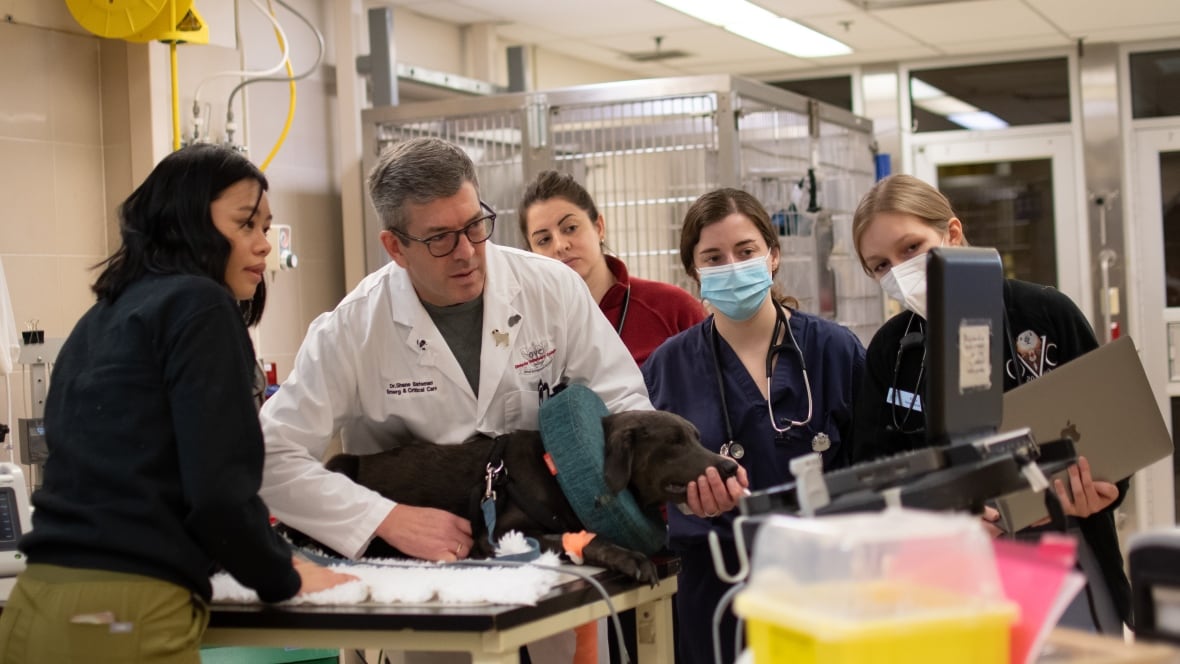Top Stories
New Forensic Program at OVC Equips Vets to Combat Animal Abuse

BREAKING: The University of Guelph’s Ontario Veterinary College (OVC) has just launched a pioneering forensic science program aimed at equipping future veterinarians with critical skills to identify and report animal abuse and neglect. This urgent initiative, which began rolling out this month, marks a major step in addressing a pressing issue in animal welfare.
The OVC, Canada’s oldest veterinary college, is offering this program as an elective for fourth-year students in week-long rotations. Students will learn to recognize signs of abuse or neglect, enhancing their ability to advocate for animals who cannot speak for themselves. According to Dr. Shane Bateman, a professor in emergency and critical care medicine at OVC, an astounding 90 percent of veterinarians will likely encounter cases of animal cruelty throughout their careers.
Dr. Bateman emphasized the importance of this training, stating, “What’s strongly motivating me to bring this education into our curriculum is to change the outcome from the research that shows that veterinarians aren’t necessarily always that good at reporting their suspicions.” Many veterinarians face challenges in identifying and reporting suspected abuse, often due to a lack of training and confidence.
Crucially, crimes against animals must be reported to the Provincial Animal Welfare Services (PAWS), which investigates these cases. However, PAWS declined to comment for this article. The Ontario SPCA and Humane Society’s Chief Veterinary Officer, Dr. Jill Kirk, highlighted the significance of this training: “If you’re just doing your routine exam, you might miss some signs that might raise a red flag or two.”
Students participating in the forensic veterinary sciences program will receive both classroom instruction and hands-on field training, including mock crime scene investigations. This practical approach aims to ensure that future veterinarians can accurately identify and report potential abuse cases.
Fourth-year veterinary student Diana Fitzgerald expressed her enthusiasm for the program, stating, “It feels like it goes hand in hand with the forensic sciences. You can tell so much about the past affective states an animal may have gone through by focusing in on forensic work.” She believes the experience has made her better prepared to recognize signs of neglect or abuse in her future practice.
Dr. Bateman stressed the need for veterinarians to bridge the gap between their education and practical application when it comes to animal welfare. “What we need to focus on is how do we close that gap? How do we give veterinarians the confidence and skills to be able to follow through on their instincts when they think that there’s something that’s not quite right?”
As this innovative program takes flight, the OVC is setting a new standard for veterinary education in Canada. The rollout of the forensic science program is not merely an academic advancement; it represents a vital response to a growing need for vigilance in animal welfare.
Stay tuned for more updates as this program develops and impacts the future of veterinary care in Ontario and beyond.
-

 World3 months ago
World3 months agoScientists Unearth Ancient Antarctic Ice to Unlock Climate Secrets
-

 Entertainment3 months ago
Entertainment3 months agoTrump and McCormick to Announce $70 Billion Energy Investments
-

 Lifestyle3 months ago
Lifestyle3 months agoTransLink Launches Food Truck Program to Boost Revenue in Vancouver
-

 Science3 months ago
Science3 months agoFour Astronauts Return to Earth After International Space Station Mission
-

 Technology2 months ago
Technology2 months agoApple Notes Enhances Functionality with Markdown Support in macOS 26
-

 Top Stories1 week ago
Top Stories1 week agoUrgent Update: Fatal Crash on Highway 99 Claims Life of Pitt Meadows Man
-

 Sports3 months ago
Sports3 months agoSearch Underway for Missing Hunter Amid Hokkaido Bear Emergency
-

 Politics2 months ago
Politics2 months agoUkrainian Tennis Star Elina Svitolina Faces Death Threats Online
-

 Technology3 months ago
Technology3 months agoFrosthaven Launches Early Access on July 31, 2025
-

 Politics3 months ago
Politics3 months agoCarney Engages First Nations Leaders at Development Law Summit
-

 Entertainment3 months ago
Entertainment3 months agoCalgary Theatre Troupe Revives Magic at Winnipeg Fringe Festival
-

 Politics1 week ago
Politics1 week agoShutdown Reflects Democratic Struggles Amid Economic Concerns





















